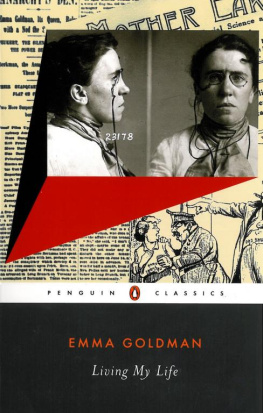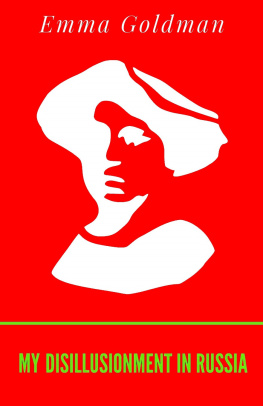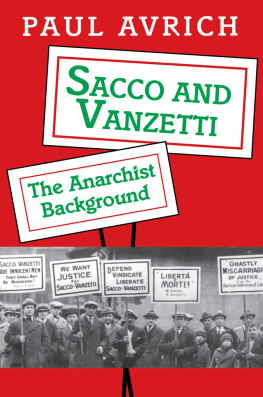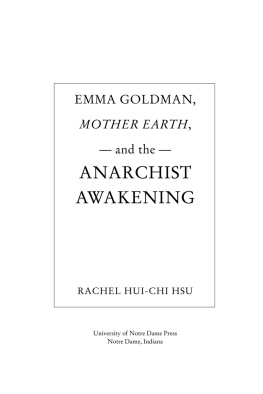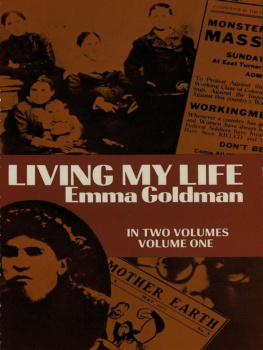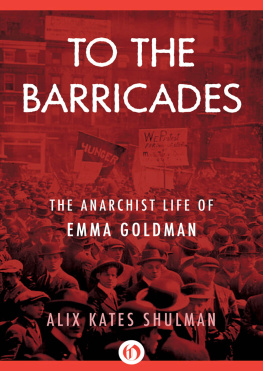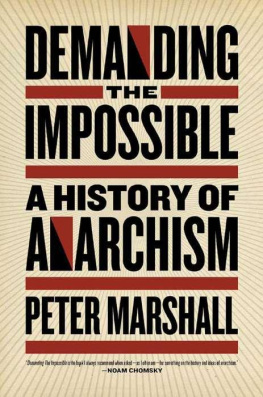Living My Life
by
Emma Goldman
1931

All Your Books Are Belong To Us !
http://c3jemx2ube5v5zpg.onion
Living My Life
Copyright 1931 Emma Goldman
Published by Alfred A. Knopf, 1931
ISBN : 0-486-22544-5
Living My Life is the autobiography of Lithuanian-born anarchist Emma Goldman, published in two volumes in 1931 (Alfred A. Knopf) and 1934 (Garden City Publishing Company). Goldman wrote it in Saint-Tropez, France, following her disillusionment with the Bolshevik role in the Russian revolution. The text thoroughly covers her personal and political life from early childhood through to 1927, and has constantly remained in print since, in original and abridged editions. Since the autobiography was published nine years before Goldman died in 1940, it does not record her role in the Spanish Civil War.
Contents
[]
Go slower, beating heart of mine-and close, ye bleeding wounds-this is my final day-and these its waning hours.
In Appreciation
Suggestions that I write my memoirs came to me when I had barely begun to live, and continued all through the years. But I never paid heed to the proposal. I was living my life intensely what need to write about it? Another reason for my reluctance was the conviction I entertained that one should write about ones life only when one had ceased to stand in the very torrent of it. When one has reached a good philosophic age, I used to tell my friends, capable of viewing the tragedies and comedies of life impersonally and detachedly particularly ones own life one is likely to create an autobiography worth while. Still feeling adolescently young in spite of advancing years, I did not consider myself competent to undertake such a task. Moreover, I always lacked the necessary leisure for concentrated writing.
My enforced European inactivity left me enough time to read a great deal, including biographies and autobiographies. I discovered, much to my discomfiture, that old age, far from ripening wisdom and mellowness, is too often fraught with senility, narrowness, and petty rancour. I would not risk such a calamity, and I began to think seriously about writing my life.
The great difficulty that faced me was lack of historical data for my work. Almost everything in the way of books, correspondence, and similar material that I had accumulated during the thirty-five years of my life in the United States had been confiscated by the Department of Justice raiders and never returned. I lacked even my personal set of the Mother Earth magazine, which I had published for twelve years. It was a problem I could see no solution for. Sceptic that I am, I had overlooked the magic power of friendship, which had so often in my life made mountains move. My staunch friends Leonard D. Abbott, Agnes Inglis, W. S. Van Valkenburgh, and others soon put my doubts to shame. Agnes, the founder of the Labadie Library in Detroit, containing the richest collection of radical and revolutionary material in America, came to my aid with her usual readiness. Leonard did his share, and Van spent all his free time in research work for me.
In the matter of European data I knew I could turn to the two best historians in our ranks: Max Nettlau and Rudolf Rocker. No further need to worry with such an array of co-workers.
Still I was not appeased. I needed something that would help me re-create the atmosphere of my own personal life: the events, small or great, that had tossed me about emotionally. An old vice of mine came to my rescue: veritable mountains of letters I had written. Often I haa been chided by my pal Sasha, otherwise known as Alexander Berkman, and by my other friends, for my proclivity to spread myself in letters. Far from virtue bringing reward, it was my iniquity that gave me what I needed most the true atmosphere of past days. Ben Reitman, Ben Capes, Jacob Margolis, Agnes Inglis, Harry Weinberger, Van, my romantic admirer Leon Bass, and scores of other friends readily responded to my request to send me my letters. My, niece, Stella Ballantine, had kept everything I had written her during my imprisonment in the Missouri penitentiary. She, as well as my dear friend M. Eleanor Fitzgerald, had also preserved my Russian correspondence. In short, I was soon put into possession of over one thousand specimens of my epistolary effusions. I confess that most of them were painful reading, for at no time does one reveal oneself so much as in ones intimate correspondence. But for my purpose they were of utmost value.
Thus supplied, I started for Saint-Tropez, a picturesque fisher nest in the south of France, in company of Emily Holmes Coleman, who was to act as my secretary. Demi, as she is familiarly called, was a wild wood-sprite with a volcanic temper. But she was also the tenderest of beings, without any guile or rancour. She was essentially the poet, highly imaginative and sensitive. My world of ideas was foreign to her, natural rebel and anarchist though she was. We clashed furiously, often to the point of wishing each other in Saint-Tropez Bay. But it was nothing compared to her charm, her profound interest in my work, and her fine understanding for my inner conflicts.
Writing had never come easy to me, and the work at hand did not mean merely writing. It meant reliving my long-forgotten past, the resurrection of memories I did not wish to dig out from the deeps of my consciousness. It meant doubts in my creative ability, depression, and disheartenings. All through that period Demi held out bravely and encouragement proved the comfort and inspiration of the first year of my struggle.
Altogether I was very fortunate in the number and devotion of friends who exerted themselves to smooth the way for Living My Life. The first to start the fund to secure me from material anxiety was Peggy Guggenheim. Other friends and comrades followed suit, giving without stint from their limited economic means. Miriam Lerner, a young American friend, volunteered to take Demis place when the latter had to leave for England. Dorothy Marsh, Betty Markow, and Emmy Eckstein typed part of my manuscript as a labour of love. Arthur Leonard Ross, kindest and most lavish of men, gave me his untiring efforts as legal representative and adviser. How could such friendship ever be rewarded?
And Sasha? Many misgivings beset me when we began the revision of my manuscript. I feared he might resent seeing himself pictured through my eyes. Would he be detached enough, I wondered, sufficiently objective for the task? I found him remarkably so for one who is so much a part of my story. For eighteen months Sasha worked side by side with me as in our old days. Critical, of course, but always in the finest and broadest spirit. Sasha also it was who suggested the title, Living My Life.
My life as I have lived it owes everything to those who had come into it, stayed long or little, and passed out. Their love, as well as their hate, has gone into making my life worth while.
Living My Life is my tribute and my gratitude to them all.
Emma Goldman
Saint-Tropez, France
January 1931
Part I
Chapter 1
It was the 15th of August 1889, the day of my arrival in New York City. I was twenty years old. All that had happened in my life until that time was now left behind me, cast off like a worn-out garment. A new world was before me, strange and terrifying. But I had youth, good health, and a passionate ideal. Whatever the new held in store for me I was determined to meet unflinchingly.
How well I remember that day! It was a Sunday. The West Shore train, the cheapest, which was all I could afford, had brought me from Rochester, New York, reaching Weehawken at eight oclock in the morning. Thence I came by ferry to New York City. I had no friends there, but I carried three addresses, one of a married aunt, one of a young medical student I had met in New Haven a year before, while working in a corset factory there, and one of the

